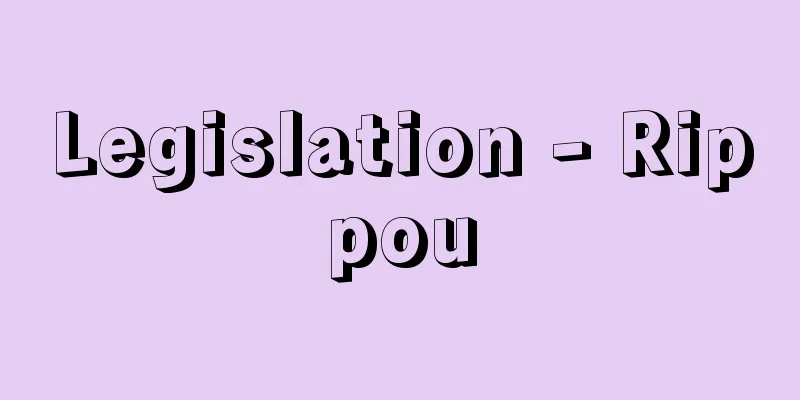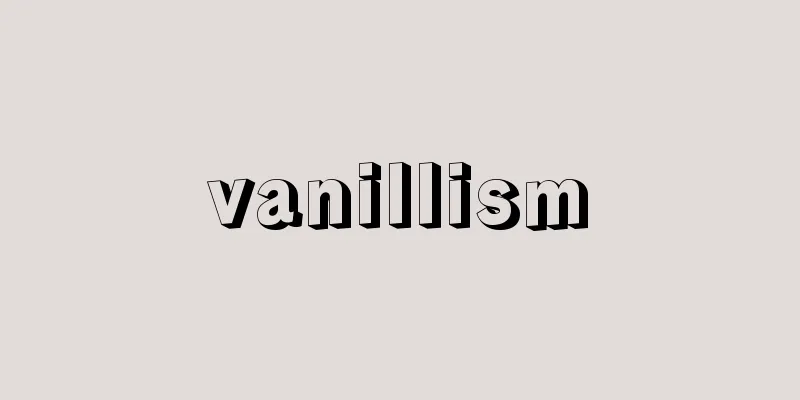Legislation - Rippou

|
The act of enacting laws by public (mainly national) power. In a broad sense, legislation does not only include the enactment of laws by the Diet (statutes), but also includes administrative agencies such as cabinet orders, ministerial orders, court rules by the Supreme Court, and ordinances by local governments. In a narrow sense, it refers to the act of enacting laws in the Diet, as Article 41 of the Constitution stipulates that "The Diet shall be the sole law-making organ." [Hiroshi Tanaka] Legislation and the rule of lawUntil the end of the 12th and 13th centuries, the concept of law-making did not exist in Europe. As seen in the phrase "Kings and officials must govern according to the law of God, the law of nature, and the customary law of the country," it was thought that "law is something that is discovered." Therefore, even when it comes to the "rule of law," it ultimately relies on the goodwill and self-restraint of rulers, and if a despot or tyrant who ignores the law appears, they cannot be restrained by law, and feudal nobles have no choice but to restrict the actions of the monarch through violence. However, when Parliament was established in England at the end of the 13th century and the legislative power of the House of Commons was established by the middle of the 14th century, the idea that the "rule of law" is to govern by following the laws enacted by Parliament became established. In this sense, it can be seen that the idea of legislation had a modern character. However, until the modern state was established by the civil revolutions of the 17th and 18th centuries, the absolute monarchs of each country still had strong legislative power, so the true "rule of law" had not yet been realized there. Therefore, it was only when the parliament in a modern state assumed the character of representing the people that the concept of legislation and the modern, democratic notion of the "rule of law" came to coincide. In Japan before the Second World War, the Emperor had the power to issue imperial decrees and other legislative powers, and the Imperial Diet was in a position to support the Emperor's legislative power, and was not the only legislative body, so the concept of legislation there could not be said to be truly democratic. [Hiroshi Tanaka] Legislative ProcessThe legislative process in the Diet follows the following order: proposal → deliberation → resolution → promulgation. Bills can be proposed not only by Diet members but also by the Cabinet. There are two types of bills: bills submitted by Diet members (private bills) and bills submitted by the Cabinet (public bills), with the latter being overwhelmingly more numerous and qualitatively more important. This is because the Cabinet can mobilize bureaucrats from various government agencies to draft bills from a national perspective. Bills are discussed in various standing and special committees in both the House of Representatives and the House of Councillors, but public hearings are held for important bills to hear the opinions of academics and interested parties. Bills that are passed by a majority of the members present in various committees are submitted to the plenary sessions of both the House of Representatives and the House of Councillors. A bill may be submitted to either House first, but the budget must be submitted to the House of Representatives first. A plenary session is held with the attendance of at least one-third of the total members of each House, and a bill is passed with the approval of a majority of the members present. When a bill is passed by both the House of Representatives and the House of Councillors, the bill becomes law. However, if the two Houses cannot agree on a bill, a joint conference of both Houses is held to reconcile their opinions, but if no agreement can be reached, the bill becomes law if it is passed (revoted) by a majority of at least two-thirds of the members present in the House of Representatives. Regarding the budget and treaties, the House of Representatives has absolute superiority in the event of a disagreement between the two Houses. Laws enacted by the Diet are signed by the relevant Minister of State, countersigned by the Prime Minister, and promulgated in the name of the Emperor. [Hiroshi Tanaka] Issues surrounding legislationModern nations are called welfare states, and the scope of administrative affairs handled by the government in areas such as economic, labor, and social policies has expanded significantly, leading to the so-called bloating of the executive branch and a huge increase in the number of delegated legislation by administrative agencies. Although it is stipulated that government ordinances cannot impose penalties, obligations, or restrictions on rights without legal delegation (Article 73, paragraph 6, of the Constitution, Article 11 of the Cabinet Law), it has been pointed out that this dramatic increase in delegated legislation is a problem in that it neglects the role of law-making, which should be carried out by the Diet, the representative body of the people, and leaves it to the executive branch. Another criticism is that as the executive branch becomes bloated, the role played by bureaucrats in the legislative process has increased, and collusion between bureaucrats and lawmakers has deepened, which means that the will of the people is not being fully reflected in legislative action. Furthermore, some point out the danger that the activities of various pressure groups that have emerged in the context of modern nations, where people's lives are becoming more diverse and the interests of the people are becoming increasingly complex, are distorting the normal operation of the Diet in order to realize special interests, and thus hindering the legislative function that should realize the interests of the general public. Incidentally, when the Democratic Party came to power in September 2009, a move is underway to eliminate the traditional bureaucracy-led legislative process and change to a politically-led legislative process led by the ruling party. [Hiroshi Tanaka] [References] | | | |Source: Shogakukan Encyclopedia Nipponica About Encyclopedia Nipponica Information | Legend |
|
公(主として国)権力による法律の制定作用。広義には、国会による法律の制定(制定法statute)に限らず、行政官庁たとえば、内閣の発する政令、大臣の命令、最高裁判所による裁判所規則、地方公共団体による条例の制定なども立法の概念に含まれる。狭義には、憲法第41条に「国会は……唯一の立法機関である」と規定されているように、国会における法律制定の作用をさす。 [田中 浩] 立法と法の支配12、13世紀末ごろまでは、ヨーロッパにおいても立法Law-makingという観念はなく、「国王も官吏も神の法、自然法、この国の慣習法に従って統治しなければならない」ということばにみられるように、「法は発見するもの」と考えられていた。このため、「法の支配」といっても、結局は為政者の善意や自己抑制に頼るほかなく、もしも法を無視する専制君主や暴君が出現したときには、法によって抑制することができず、封建貴族たちは暴力によって君主の行為を制限する以外に方法がなかった。しかし、13世紀末のイギリスに議会が設立され、14世紀中ごろまでに下院の立法権が確立されるようになって、議会において制定された法律を守って政治を行うことが「法の支配」であるという観念が定着していった。この意味で、立法という観念は近代的性格をもつものであったことがわかる。もっとも、17、18世紀の市民革命によって近代国家が成立するまでは、各国の絶対君主はなお強大な立法権をもっていたから、そこでは真の意味での「法の支配」はまだ実現していなかった。したがって、近代国家において議会が国民代表的な性格をもつようになって初めて、立法の概念と近代的・民主的な「法の支配」観念とが合致するようになった。第二次世界大戦前の日本では、天皇は勅令その他の立法権をもち、帝国議会は天皇の立法権を協賛する地位にあり、また唯一の立法機関でもなかったから、そこでの立法観念は真に民主的なものとはいえなかった。 [田中 浩] 立法過程国会における立法過程は、発案→審議→議決→公布という順序をとる。発案は、議員はもとより内閣にも認められている。法案には議員提出の法案(Private Bill)と内閣提出の法案(Public Bill)があるが、後者のほうが圧倒的に多くかつ質的に重要なものが多い。内閣は、諸官庁の官僚を動員し、全国家的な視野から法案を作成することができるからである。 法案の審議は衆・参両院に設けられた各種常任・特別委員会などで行われるが、重要法案については公聴会が開かれ、学識経験者や利害関係者の意見を聴取する。各種委員会において出席議員の過半数で可決された法案は、衆・参両院の本会議に提出される。法案はどちらの院に先に提出してもよいが、予算はかならず衆議院に先に提出しなければならない。本会議はおのおの総議員の3分の1以上の出席をもって開かれ、出席議員の過半数の賛成で法案は議決される。衆・参両院において議決されたとき、その法案は法律となる。もっとも、両院の意見が一致しない場合には、両院協議会を開いて意見調整を図るが、調整がつかないときには、法案に関しては、衆議院で出席議員の3分の2以上の多数をもって可決(再議決)すれば、その法案は法律となる。なお予算・条約に関しては、両院の意見が不一致の場合、衆議院の絶対的優越が認められている。 国会において成立した法律は、主任の国務大臣が署名し、内閣総理大臣が連署し、天皇の名において公布される。 [田中 浩] 立法をめぐる問題点現代国家は福祉国家とよばれ、経済・労働・社会政策などに関する政府の取り扱う行政事務の範囲が著しく拡大し、いわゆる行政部の肥大化を招き、行政機関による委任立法の数もきわめて増大している。政令には法律の委任がなければ罰則を設けたり、義務を課しもしくは権利を制限する規定を設けることができない(憲法73条6号、内閣法11条)とされているが、このような委任立法の著しい増大は、本来、国民代表機関たる国会においてなされるべき法律の制定作用を軽視し、とかく行政府にゆだねることになりはしないかという問題点が指摘されている。もう一つは、行政府の肥大化とともに、立法過程における官僚の果たす役割が増大し、官僚と議員との癒着がますます深まることによって、国民の意志が十分に立法作用に反映されないのではないか、という批判がある。さらに、国民生活が多様化し、国民相互間の利害がますます複雑化しつつある現代国家の状況下で登場した各種圧力団体の活動が、特殊利益の実現を目ざして、国会における正常な運営をゆがめ、そのことが一般国民の利益を実現すべき立法の機能を妨げている、という危険性を指摘する声もある。ところで2009年(平成21)9月に民主党政権が成立すると、従来の官僚主導型の立法過程を排し、政権政党による政治主導型立法過程へと変更する方向が打ち出されつつある。 [田中 浩] [参照項目] | | | |出典 小学館 日本大百科全書(ニッポニカ)日本大百科全書(ニッポニカ)について 情報 | 凡例 |
<<: Torah (English: tôrāh) Hebrew
Recommend
Air-hardening plastic refractories
…Water is added to make it into a clay-like mater...
Court summary - Saibanshosho
An imperial law book from the early Kamakura perio...
Yamauchi clan
Fujiwara clan. They are said to be descendants of ...
Atonement - Atonement
It refers to an item offered as payment to be pur...
ranalian theory
…The characteristics of this group are that they ...
Rhododendron wadanum (English spelling) Rhododendronwadanum
…[Yoshiharu Iijima]. … *Some of the terminology t...
traction drive
…In the fluid friction system, a thin film of oil...
Mr. Yamaguchi
A feudal lord in the early modern period. Born in ...
Crater basin
A flat lowland located between the outer rim and ...
Barthelo University
…With the emergence of Charles Darwin in the 19th...
Erdeni zuu (English spelling)
The oldest Lamaist temple in Outer Mongolia, locat...
Swat (English spelling)
The name of a region centered on the Swat Valley i...
"The Bloody History of the Korean Independence Movement"
…In 1911, he escaped the country and lived in exi...
Radloff, FW (English spelling) RadloffFW
…Russian orientalist, Turkologist, and ethnologis...
Archives - Akaibuzu
According to the Archives Glossary (Osaka Univers...









